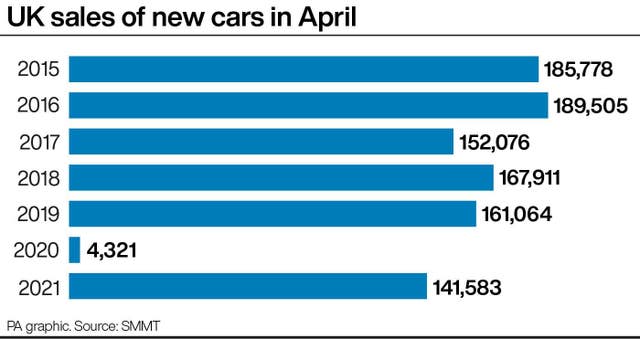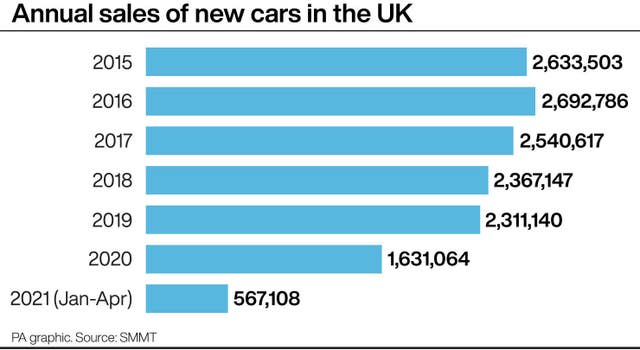The full recovery of the new car industry “is still some way off” despite an increase in sales, according to a trade association.
Some 141,583 new cars were registered in the UK in April, the Society of Motor Manufacturers and Traders (SMMT) said.
That dwarfed the total of 4,321 recorded in the same month in 2020, when the country was in a full coronavirus lockdown.
But it is 12.9% lower than the April average between 2010 and 2019.

The SMMT said the full impact of dealerships being allowed to reopen in April after more than three months of closure is not fully reflected in the figures, as there is often a delay of several weeks between a customer visiting a showroom, deciding on a model and taking delivery of their new vehicle.
It recently raised its forecast of the number of new cars which will be registered this year to 1.86 million, up from the prediction of 1.83 million it issued in February.
The industry body said this is because “the economic backdrop has improved noticeably over the recent weeks on the back of successful vaccine rollout”.
An annual total of 1.86 million would represent a 14.1% increase on last year, but a 20.2% decrease on average annual registrations between 2010 and 2019.

SMMT chief executive Mike Hawes said: “After one of the darkest years in automotive history, there is light at the end of the tunnel.
“A full recovery for the sector is still some way off, but with showrooms open and consumers able to test drive the latest, cleanest models, the industry can begin to rebuild.
“Market confidence is improving, and we now expect to finish the year in a slightly better position than anticipated in February, largely thanks to the more upbeat business and consumer confidence created by the successful vaccine rollout.
“That confidence should also translate into another record year for electric vehicles, which will likely account for more than one in seven new car registrations.”
"After one of the darkest years in auto history, there is light at the end of the tunnel. A full recovery is some way off, but with showrooms open & consumers able to test drive the latest, cleanest models, industry can begin to rebuild"@MikeHawesSMMThttps://t.co/0omqn0yMDC pic.twitter.com/RAi55RZ44V
— SMMT (@SMMT) May 5, 2021
Jim Holder, editorial director of magazine and website What Car?, said the coming months will be “critical” to the industry’s recovery from the pandemic.
He predicted that “demand will remain strong”, but stressed the importance of showrooms remaining open for the remainder of the year.
Another lockdown would be “potentially ruinous for many operators”, he said.
Mr Holder also warned that a global shortage of microchips has created a car production backlog, forcing some manufacturers to suspend operations.
“What this means for consumers is potentially longer waiting times on vehicles they’ve already ordered or are looking to order, and diminishing stock to choose from,” Mr Holder said.
“The production setbacks will likely take months to solve, meaning the delays could be significant. That means more bad news for new car makers.”
Plug-in cars, such as pure electric and plug-in hybrid models, accounted for 13.2% of the new car market last month.
But the market share of pure electric cars fell from 7.7% in March to 6.5% in April, following cuts to Government grants.
The market share of diesel cars was 9.9%, down from 25.0% in April 2020.
Transport Secretary Grant Shapps insisted the UK is “going further and faster to make the journeys of our future as clean as possible”, saying that more than half a million ultra-low emission vehicles are being driven on UK roads.
He went on: “With news that the half-a-million milestone has now been met, together with the UK now having the second largest EV (electric vehicle) market in Europe, it’s clear that the shift to green motoring is accelerating at speed.”




Comments: Our rules
We want our comments to be a lively and valuable part of our community - a place where readers can debate and engage with the most important local issues. The ability to comment on our stories is a privilege, not a right, however, and that privilege may be withdrawn if it is abused or misused.
Please report any comments that break our rules.
Read the rules here